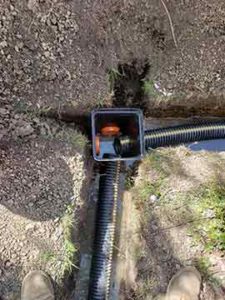
Despite their name, drain tiles are actually not tiles. Drain tiles, also known as a French drain, are pipes that are buried in the ground around the entire perimeter of a house and surrounded with gravel. They protect the foundation of the house from surface runoff by collecting the water before it can reach the base of the house and discharging it in a safe place.
As Paramount Management & Realty explains, they are essential for homes on soil with poor drainage or if the characteristics of land make it easy for water to collect around a building’s foundation. A drain tile system consists of perforated pipes inside a trench dug around the home and surrounded with gravel. The setup is further surrounded by landscape fabric and sand to keep debris out of the pipes.
Installing a French drain in your backyard
Here are a few things to think about before you install a French drain tile system in your backyard:
- Think of where the water from the drain tile system will go. You want the water to be able to flow away from the house – under the force of gravity – to a natural waterway or similar location. The water should not go toward another property or a septic leach field.
- If the slope of your land or the area around the house does not permit water to flow away naturally, you will need a sump pit or dry well to hold the water temporarily. Dry wells should be dug in the lowest area on the land and should be large enough to hold water until it can soak into the ground.
- If this is not an option, a sump pit can also serve the same purpose. Water from the drain tile system is channeled into the pit, from where it is pumped out and discharged in a safe location on your property or into your municipality’s systems for removing stormwater.
- Lastly, before you lay a drain tile system in your backyard, think of what you will do with the dirt left after you have backfilled the trench. A good way to utilize dirt is to make raised flowerbeds or use it to level a part of your land.
Steps for installing a drain tile system in the backyard
What you will need:
- A trencher or shovel
- 4-inch perforated drainpipes
- ¾ inch drain rock (gravel) or polystyrene
- Sand
- Landscape fabric or filter cloth
Step one: Digging the trench
Two important things to keep in mind when digging the trench are maintain a constant slope toward the point where you want the water to be discharged and keep the surface of the trench level to avoid dips where water can collect.
The trench should be around 12” wide and 8-24” deep. It should slope at the rate of ¼ per foot. This means it will be deeper at the runoff point than it is at the drainage point. The easy way to make your trench is with a trencher, but you may have to do it by hand (with a shovel) if the land is soft and muddy.
Step two: Fill the bottom of the trench
If you used a trencher to make your trench, you may still need to shovel some of the dirt out along the entire length of the trench to make the surface level. After the trench is completed fill it with gravel to a height of about 2” and then lay landscape fabric or filter cloth over the gravel to prevent weeds.
Step three: Lay the drainpipes
You will need corrugated flexible plastic drainpipes. These have a diameter between 4-12” but you will typically use 4” pipes. Drainpipes are also available as 10-foot rigid PVC pipes with holes on one side. Corrugated pipes will often have slits across their entire surface. If there are concerns that the pipes may get crushed after the trench is backfilled, use PVC pipes.
The pipes are typically laid with the perforations facing down, especially if you use pipes with perforations on only one side of them. If there are curved points along the pipe, make sure the connections are secured with elbows and couplings. After the pipes are laid, backfill with gravel to around 2” below grade and then cover with dirt.
Step four: Install cleanouts
Ideally, you should have two cleanouts: one at each end of the drain. Cleanouts make it easy to clear your drain tile system off debris without having to dig up pipes. A cleanout fitting is a tee that is installed slightly above grade, with a cap for easy access to the drain.
If the drain tile system starts to get blocked with debris, you can easily insert a garden hose through the cleanout port to flush the system. For blockages which are a bit harder to remove, you can use an auger.